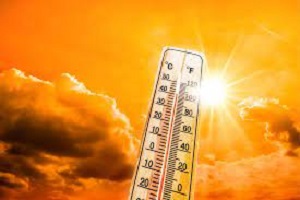By Setareh Kiumarsi
The weather is hot; so hot it feels like fire is pouring down from the sky. In this intense heat, how mindful are you about what you eat? How much attention are you giving to your digestive system and its needs?
Imagine your digestive system as a cooking pot. In each meal, you throw in a mix of different foods, and you’re expecting this pot to cook and digest everything properly.
Now think about how you actually cook food. You light a fire under the pot, add some oil or water, and then pour in your ingredients.
In your digestive system, the fire under the pot is bile, stomach acid, and digestive enzymes. The water or oil inside the pot is your saliva and the mucus lining your digestive tract. This moisture helps food slide through smoothly and transforms it from something hard and solid into something soft and digestible; so the enzymes can mix with it and break it down.
Now imagine that in this hot weather, you spend hours under the sun. The heat and fire element completely wrap around your body. As a result, the water element starts to dry up inside you; including in your digestive system. Think of a pot with a blazing fire underneath but no water or oil left inside, everything has evaporated.
So the idea that “because fire is high in summer, our digestion must be stronger” is actually a myth.
Now let’s say in this condition, you go out with friends for lunch or dinner and enjoy a heavy meal like pasta or pizza. What does that mean? It means you’re throwing a sticky, hard-to-digest food into a pot with no moisture and a huge fire burning underneath. What happens? Not only does the food not cook—it burns on the bottom, stays raw on top, and sits in your digestive system for hours, undigested.
That’s why, during summer, it’s so important to avoid heavy, greasy, hard-to-digest meals as much as possible—things like cheeseburgers, lasagna, pasta, pizza, etc.
What Not to Eat in Summer?
We’ve talked about the condition of the digestive system and how the power of digestion weakens in the summer heat. So what can we do to help it function well, even when the temperature hits 40°C?
First of all, cut back on spicy, intense seasonings in your cooking; things like black pepper, red pepper, curry, chili, masala, cayenne, black cumin, fenugreek seeds, mustard, and so on. Instead, focus on gentle warming spices like fennel, cardamom, saffron, rosemary, basil, and turmeric. And for every three parts of warming spices you use, be sure to include one part of a cooling spice like dried rose petals, coriander seeds, or sumac. In general, try not to make your food too heavily spiced in this season.
Don’t overdo it with naturally “hot” foods either. What kind of foods are those? Things like eggplant, ginger, dill, raw garlic and onion, scallions, raw radishes, caffeine-containing drinks (like black tea, green tea, coffee, instant coffee), chocolate, alcohol, energy drinks, walnuts, peanuts, peanut butter, cashews, hazelnuts, sesame seeds, and tahini.
Instead, bring cooling foods into your diet—like cooked apples or pears, cooked cooling vegetables such as cilantro, celery, mung bean sprouts, zucchini, okra, and so on.
Avoid foods that are extremely salty—like cheese puffs, chips, salted snacks, overly salty pickles, and similar items. In summer, due to the intense heat, your body’s moisture levels naturally drop. Now imagine putting a few tablespoons of salt into a small bowl of water—what happens? The salt absorbs all the moisture and turns the bowl into a salty wasteland.
Avoid foods that are overly sour, too; things like vinegar, vinegar-based pickles, sauces made with vinegar (like ketchup and mayonnaise), sour cherries, plums, fruit leather, tamarind, and fermented foods like aged cheese, whey, sour yogurt, sour cream, kombucha, and the like. Why? Overconsumption of sour foods in hot weather increases the likelihood of skin issues; rashes, eczema, acne, itching, and so on.
In general, remember that sweet, bitter, and astringent tastes help cool the body during summer. What does that include? Sweetness from fruits like grapes, cantaloupe, watermelon, or from milk. Bitterness from things like barley water or fresh cilantro. And astringency from apples, pears, and mung bean sprouts.
Summer… What should I eat?
In the previous article, we talked about the state of the digestive system during summer, how digestive power weakens in the heat, and the types of foods we should avoid during this season. Now let’s talk about what we should eat in this hot weather.
On extremely hot summer days, you’re wrapped in sunlight and heat; it’s as if you’ve been sitting in a sauna. This increases the fire element in your body and significantly decreases the water element. So it’s very important to hydrate your body and maintain your electrolyte balance. How? Every hour, drink a glass of lukewarm water (slightly warmer than room temperature) with a few drops of lemon juice and a pinch of salt. If you’ve been exposed to the sun for a long time, add a small spoonful of a natural sweeteners like grape syrup or maple syrup to the mix. Just remember that the flavor should be very mild; the water should only have a slightly astringent taste, not something intensely sweet, sour, or salty.
Try to begin every meal with something sweet; like a few dried mulberries, one date, or one fig. Why? Remember in the previous post we talked about how, in very hot weather, the water element in the digestive tract decreases and digestion becomes sluggish? Sweet foods help generate moisture, and when your first bite is sweet, it’s like pouring water or oil into a hot pot before adding raw ingredients. So instead of saving sweet things for dessert, try eating them at the beginning of your meal.
Try to lean more toward a vegetarian or low-meat diet during summer. Why? The digestive system is designed to release bile based on the volume and heaviness of protein consumed in a meal. Bile is a bitter, sharp, and intense fluid; like bleach. It’s extremely hot and dry and full of fire. So the bigger and heavier your steak, the more bile (or fire) is released into your digestive tract. This causes your digestive system—and your whole body—to get even hotter and drier. That’s why eating high-protein, heavy animal-based foods in summer is like lighting a bonfire inside your body.
That’s also why, in order to cool down the excess internal and external heat of summer, your body naturally craves moist, light, and hydrating foods; like juicy fruits, and other cooling dishes.
Summer foods
We’ve already discussed the digestive system, how digestive power weakens in the heat, and what we should eat more or less of. But in this weather, what else can we enjoy?
If you’re craving a refreshing drink in the summer heat, try this: in one glass of water (preferably not ice-cold), add one to two tablespoons of grated cucumber (with its peel), two teaspoons of fresh lemon juice, two teaspoons of grape syrup or maple syrup, two tablespoons of rose water or coconut water, one teaspoon of rosewater, and a pinch or two of salt. If you like, you can also add a few sprigs of fresh coriander or mint. Enjoy!
Here’s another option: in a glass of lukewarm water, mix two teaspoons of soaked teff seeds, one teaspoon of soaked basil seeds, a few drops of lemon juice, and one teaspoon of honey. Drink and enjoy.
What if you’re craving an herbal tea in this heat? First of all, avoid coffee, instant coffee, and herbal teas made with very warming herbs like ginger, cumin, thyme, black tea, green tea, or masala.
So what should you drink instead? Mix the following whole herbs (not powdered) in the given ratios in a jar: hibiscus (2 parts), chamomile (2 parts), lemon verbena (1 part), and dried rose petals (1 part). Your “part” can be anything—a small teacup, for example.
Whenever you want to brew this tea, take one teaspoon of the mixture, pour it into a cup of boiling water, let it steep for a few minutes, and enjoy. You can even add one tablespoon of rose water to it for extra cooling and relaxation.
What else? How about a glass of fresh watermelon juice or cantaloupe juice? Just keep in mind—if you tend to get bloated easily, you can help digestion by adding a pinch of nutmeg or saffron and a pinch of cardamom to either drink.
What kinds of food are more suitable for hot weather?
Moist and soupy meals like stews or broths made with cooling vegetables; like cilantro, mung bean sprouts, celery, purslane, zucchini, okra, and ingredients that reduce bile flow, like verjuice, lemon, dried plums, digestive lassi, and pomegranate paste.
And by the way… don’t forget about the benefits of cooked apples during summer.
Be full of health.
Please make sure to credit the author, Setareh Kiumarsi, when sharing or republishing this article, which was written with love and the hope of good health for everyone.







